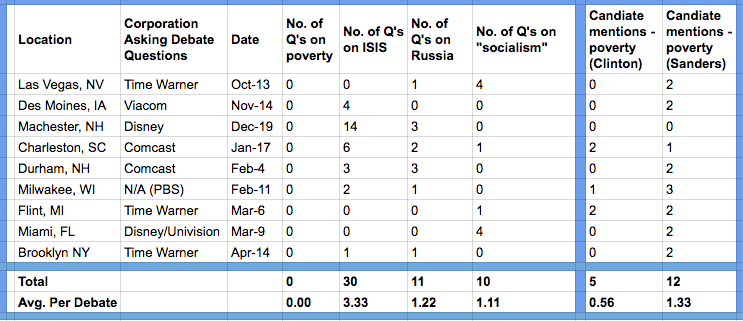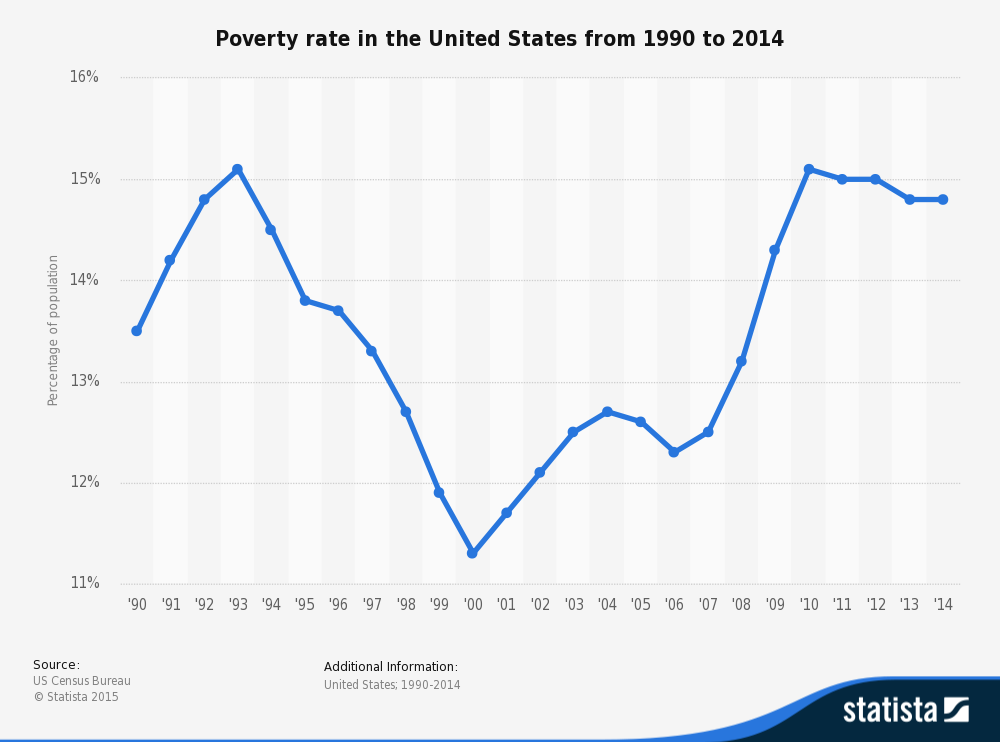|
In Nine
Democratic Debates, Not a Single Question About
Poverty
By Adam
Johnson
May 28,
2016 "Information
Clearing House"
- "FAIR"
- Over 45 million Americans live in
poverty—but you wouldn’t think potential leaders of
the country are expected to know or care anything
about this, listening to the questions asked by the
elite journalists who moderated the Democratic
debates this primary season.
A FAIR
analysis of all nine democratic debates over the
past seven months shows that not one question was
asked about poverty. By contrast, 30 questions were
asked about ISIS or terrorism (almost half of them
concentrated in the
December 19 debate, which took place days after
the San Bernardino shootings) and 11 questions were
asked Russia. Ten questions were asked about
socialism or communism, all of which were directed
at Bernie Sanders.
The
candidates themselves have brought up poverty,
either in their prepared remarks or in response to
more abstract questions about the economy. Sanders
brought up poverty in all but two debates, broaching
the topic 12 times, or approximately 1.3 times per
debate. Clinton brought up the issue five times in
total, or a little more than once every
other debate.

According
to the
2014 census, 14.5 percent of Americans, or over
45 million people, live in poverty, up from 11.3
percent in 2000. Child poverty (which Sanders points
out consistently) is especially troubling, with an
estimated 16 million Americans under the age of
18 living below the poverty line.
A 2011
study attributed
133,000 deaths a year to poverty-related
illnesses. Poverty has also been linked to
diminished IQ in children—in the United States, but
not in other wealthy countries—and has been
shown to impact economic gains, overall health and
quality of life. Put simply: Poverty touches large
swaths of America, by any objective metric.

Americans
are literally a million times more likely to live in
poverty than to have been killed by “jihadi terror”
since 9/11: The total figure for the latter is
45, or about 3 people a year. According to the
Washington Post (11/23/15),
the average American is more likely to be killed by
home furniture than a terrorist.
While vague
notions of “inequality” or “economic anxiety” were
touched on occasionally, the issue of poverty and
its effects remained entirely absent. No specific
questions about poverty, its causes or possible
federal solutions were asked by any of the
moderators in any of the nine debates. If any of the
candidates had a plan to ameliorate the plight of
the poor, the moderators weren’t interested in
hearing about it.
Eight
out of the nine debates were hosted by a subsidiary
or joint venture of one of four corporations:
Comcast,
Viacom,
Disney
and
Time Warner (combined market value
$383 billion).
CORRECTION:
The rate per year for Islamist terror deaths was
originally given as 0.33, not 3. Candidate mentions
of poverty adjusted.
Adam Johnson is a contributing analyst for
FAIR.org. Follow him on
Twitter at
@AdamJohnsonNYC.
|